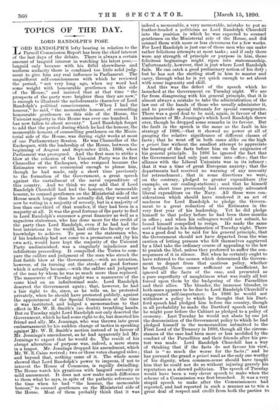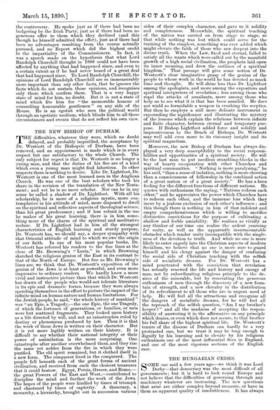TOPICS OF THE DAY.
LORD RANDOLPH'S POSE. T,ORD RANDOLPH'S lofty bearing in relation to the Parnell Commission Report has been the chief interest of the last days of the debate. There is always a certain amount of languid interest in watching his latest pose,— languid only because with his fitful shrewdness and uniform audacity there is combined too little solid judg- ment to give him any real influence in Parliament. The magnificent self-consciousness with which he reviewed the period, " not very long ago, when my word had some weight with honourable gentlemen on this side of the House," and insisted that at that time " the prospects of the party were brighter than they are now," is enough to illustrate the melodramatic character of Lord Randolph's political consciousness. " When I had the honour," he said, " the memorable honour, of counselling honourable gentlemen on this side of the House, the Unionist majority in this House was over one hundred. It has now fallen to about seventy." Lord Randolph forgot to add that the period during which he had the honour, the memorable honour, of counselling gentlemen on the Minis- terial side of the House, was during eight weeks at most of one Parliamentary Session. He was Chancellor of the Exchequer, with the leadership of the House, between the beginning of August and September 25th, 1886, when Parliament was prorogued. And the first man to strike a blow at the cohesion of the Unionist Party was its first Chancellor of the Exchequer, who resigned because the Estimates were not economical enough to please him, though he had made, only a short time previously to the formation of the Government, a great speech against the curtailment of the naval expenditure of this country. And we think we may add that if Lord Randolph Churchill had had the honour, the memorable honour, to counsel gentlemen on the Ministerial side of the House much longer than he actually did, they would not now be voting in a majority of seventy, but in a majority of less than one-third of that number, if they had been in a majority at all. It was the good fortune of the party to find in Lord Randolph's successor a great financier as well as a sagacious statesman, who has done more for the credit of the party than Lord Randolph, even if he had had the best intentions in the world, had either the faculty or the knowledge to achieve. To pose as the statesman who, if his leadership had not come to a premature end (by his own act), would have kept the majority of the Unionist Party undiminished, was a singularly injudicious and infelicitous proceeding. It compelled .the Tories to com- pare the calibre and judgment of the man who struck the first feeble blow at the Government,—with no intention, however, of its turning out the stroke of good fortune which it actually became,—with the calibre and judgment of the man by whom he was so much more than replaced. The manceuvre of Tuesday night was a manceuvre of the same kind on an infinitesimal scale. Lord Randolph deserted the Government again; that, however, he had a fair right to do, since, as he tells us, he protested privately, when he should have protested publicly, against the appointment of the Special Commission at the time it was instituted, and lodged a memorandum to that effect in Mr. W. H. Smith's (no doubt) trembling hands. But on Tuesday night Lord Randolph not only deserted the Government, which he had some right to do, but deserted his friend and ally, Mr. Jennings, who was thrown into great embarrassment by his sudden change of tactics in speaking against Mr, W. H. Smith's motion instead of in favour of Mr, Jennings's amendment, as he had apparently led Mr. Jennings to expect that he would do. The result of his abrupt alteration of purpose was, indeed, a mere storm in a teapot. Mr. Jennings dropped his amendment, which Mr. W, S. Caine revived ; two or three votes changed sides ; and beyond that, nothing came of it. The whole scene showed that Lord Randolph's power to impress, if not to interest the House of Commons, is rapidly dwindling. The House watch his gyrations with languid curiosity or mild amusement. It does not now make much difference to them what he says, in spite of the pathetic reference to the time when he had " the honour, the memorable honour," to counsel gentlemen on the Ministerial side of the House. Most of thew probably think that it was indeed a memorable, a very memorable, mistake to put BO, feather-headed a politician as Lord Randolph Churchill into the position in which he was expected to counsel gentlemen on the Ministerial side of the House, and did, counsel them with more or less cleverness for a, few weeks. For Lord Randolph is just one of those men who can make rather felicitous attempts at most tasks ; and if only there were any strength of principle or purpose in him, these felicitous beginnings might ripen into statesmanship. Unfortunately, however, that is just where Lord Randolph fails. He can catch a good preliminary notion of his duty; but he has not the sterling stuff in him to master and carry, through what he is yet quick enough to set about with some ingenuity and skill. And this was the defect of the speech which he launched at the Government on Tuesday night. We are far from disagreeing with his general principle, that it is almost always a mistake to take the administration of the law out of the hands of those who usually administer it, and to provide special tribunals for special emergencies.. There was a good deal to be said, again, in favour of that amendment of Mr. Jennings's which Lord Randolph threw- over, though he dropped some remarks in its favour. But the fault in the speech is the same as the fault in his strategy of 1886,—that it showed no power at all of gauging the relative significance of different classes of facts ; that he went off in both cases alike on the high a priori line without the smallest attempt to appreciate- the bearing of the facts before him on the exigencies of his general principle. In 1886 he ignored the fact that the Government had only just come into office ; that the alliance with the Liberal Unionists was in its infancy ; that it was a time of great European anxiety ; that the departments had received no warning of any necessity for retrenchment ; that in some directions we were, on the contrary, pledged to greater expenditure (for example, on our coaling-stations) ; and that he himself only a short time previously had strenuously advocated liberal expenditure on the Navy. All these were con- siderations which should have rendered it an act of madness for Lord Randolph to pledge the Govern- ment to a great reduction of the Estimates in the very first year of his leadership. Yet he did pledge himself to that policy before he had been three months. in office ; and when his colleagues would not submit, he found himself compelled to resign. He made the same sort of blunder in his declamation of Tuesday night. There was a good deal to be said for his general principle, that the Government should not have departed from the wise caution of letting persons who felt themselves aggrieved by a libel take the ordinary course of appealing to the law to punish the libel, unless they preferred to suffer the con- sequences of it in silence. But when he certainly ought to have referred to the causes which determined the Govern- ment to depart from that cautious policy, whether he thought those causes sufficient or insufficient, he ignored all the facts of the case, and presented as a pure superfluity of naughtiness what was really all but forced upon them by the badgering of the Parnellites and their allies. The blunder, the immense blunder, in both cases appears to be due to Lord Randolph Churchill's exaggerated self-importance. In 1886 he would not withdraw a policy to which he thought that his Dart- ford speech had pledged him before the country, though in all probability he made the Dartford speech only that he might pose before the Cabinet as pledged to a policy of economy. Last Tuesday he would not abate by one jot the denunciation of the Government policy to which he had pledged himself in the memorandum submitted to the First Lord of the Treasury in 1888, though all the circum- stances of the case had been more or less modified by the conduct of the Parnellites and their friends after his pro- test was made. Lord Randolph Churchill has a way of thinking that if the facts do not favour his view, that is " so much the worse for the facts ;" and he has pursued the grand a priori road as the only one worthy of his dignity, when common-sense should have taught him that he could not do so without injuring gravely his. reputation as a shrewd politician. The speech of Tuesday would have been a very clever speech to make when the scheme of a Commission was first broached. It was a very stupid speech to make after the Commissioners had reported, and had reported in such a manner as to win a great deal of respect and credit from both the parties to the controversy. He spoke just as if there had been no badgering by the Irish Party, just as if there had been no generous offer to them which they declined (and this though he himself admitted the offer), just as if there had been no advantages resulting from the course actually pursued, and no Report which did the highest credit to the impartiality of the Commissioners. In fact, it was a speech made on the hypothesis that what Lord Randolph Churchill thought in 1888 could not have been affected by anything that had happened since, and even to a certain extent as if he had never heard of a great deal that had happened since. To Lord Randolph Churchill, the opinions of Lord Randolph Churchill are so immeasurably more important than any other facts, that he ignores the facts which do not sustain those opinions, and recognises only those which confirm them. That is a very happy state of mind for him, no doubt. But it is not a state of mind which fits him for " the memorable honour of counselling honourable gentlemen " on any side of the House. He is an egotist who sees the political world through an egotistic medium, which blinds him to all those circumstances and events that do not reflect his own view.







































 Previous page
Previous page